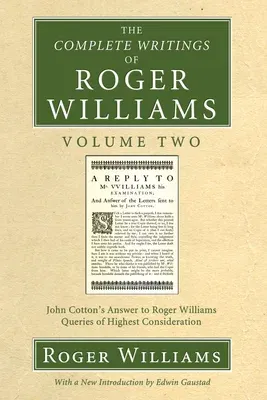Ten years after the U. S. Civil War, a group of men in Rhode Island made
a conserted effort to rescue the widely scattered writings of Roger
Williams. Few sets were printed though, and under the guidance of Perry
Miller, The Complete Writings of Roger Williams were brought back in
1963, but still in short numbers. The present collection now makes these
volumes available to readers in their original orthography. The theme of
religious liberty is dominant in these volumes, running through
Williams's correspondence with John Cotton and on through his famous
pair of works on The Bloudy Tenent of Persecution. All of the extant
shorter writings and letters of Roger Williams are included in this set,
along with two significant works resulting from his engagement with
Native Americans: his seminal Key into the Language of America and
Christenings Make Not Christians. ""Roger Williams was one of those rare
individuals who took the accepted ideas of his time and followed them to
conclusions that challenged his contemporaries and still challenge us.
To have his complete writings once again available is a great service to
all who would understand American religion and political institutions at
the deepest level."" Edmund S. Morgan Sterling Professor of History
Emeritus Yale University ""It has been America's great good fortune that
Roger Williams's career stood at the beginning of its history. Just as
some experience in the youth of a person is ever afterward a determinant
of his personality, so the American character has inevitably been molded
by the fact that in the first years of colonization there arose this
prophet of religious liberty. Later generations could not forget him or
deny him. The image of him in conflict with the founders of New England
could not be obliterated; all later righteous men would be tormented by
it until they learned to accept his basic thesis, that freedom is a
condition of the spirit."" Perry Miller (1963) Roger Williams
(1603-1683) grew up in Puritan circles in London, sailed to
Massachusetts in 1630, and, having been banished for his controversial
views on the separation of church and state, founded Rhode Island on the
basis of his new principles of religious liberty.


